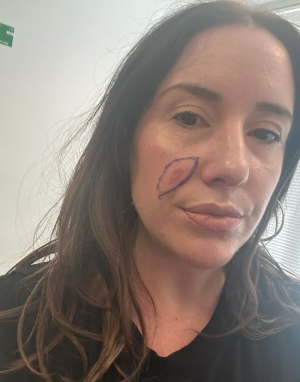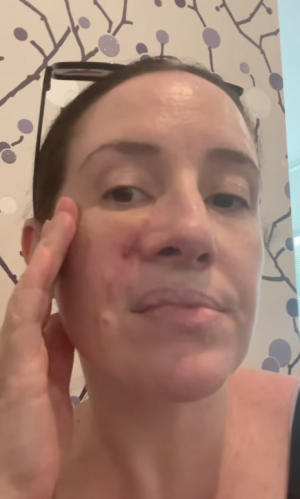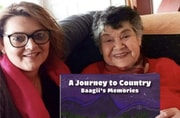Woman confuses cancer warning for usual age spot: 'This isn't something to be taken lightly'
By
VanessaC
- Replies 4
A woman initially saw a minuscule, brown dot on her face and brushed it off as an inconsequential sign of ageing.
Months later, her world was rocked when she found out that this seemingly tiny blemish was actually a warning for cancer.
As a health-conscious mother of three, 40-year-old Catherine Smartt’s journey revealed the importance of constant vigilance concerning skin health.
Residing in Geelong, Catherine's daily routine as a podcast host was abruptly disrupted in January 2024 upon her cancer diagnosis.
She had first noticed what seemed like a simple pigmentation spot on her cheek back in October 2022.
Even when she became pregnant in January 2023, her doctors considered the mark as just standard hormonal changes.
Yet as Catherine watched her 'little brown spot' change in appearance and texture over time, her concern grew.
The dot became markedly larger and rougher to touch, but still wasn't dark enough or lump-like to fit the typical melanoma image.
For two years, Catherine had been filming herself applying lipstick in her car for social media content.
Without realising it, the recordings provided an invaluable visual record of the changing spot on her skin.
'I had other spots on my face that looked the same, so there was no indication that it was cancer,' Catherine shared.
During her pregnancy, Catherine would also regularly watch Keeping Up with the Kardashians, where Khloe Kardashian coincidentally spoke about her skin cancer journey.
This prompted Catherine to be more alert.
But fresh out of pregnancy, she had assumed the apparent skin changes to be a normal post-pregnancy occurrence.
'I thought to myself, “It's because I'm pregnant, don't worry about it.”'.
She expected the spot to start healing but found it only grew more pronounced.
Two months later, a GP visit for a maternity-related consultation turned into a potentially life-saving appointment as the doctor expressed concern over the growing spot.
'Thank god I prioritised getting it checked. I was sick of having to conceal it, but what if I had accepted it or said, “This is 40, this is normal.”'
'As mums, you can't show your kids you're afraid or that something's wrong. You have to be strong for them.'
A biopsy confirmed everyone's fear—it was stage 1 skin cancer.
'It was good news because it was found early,' she said.
'I had to park everything that I needed to worry about and focus on being a parent. It was such a huge week.'
Catherine’s mum was also diagnosed with stage four melanoma when she was in primary school but is still around today.
Determined to fight the disease, she underwent a surgical procedure to remove the spot and was followed by further tissue excavation to ensure all threat was removed.
Catherine's bouts with surgeries have left her with a significant scar running down from the inner corner of her eye to her mouth. The physical change has impacted her confidence, but she remains hopeful for the future and is now on a mission to educate others.
Her primary mission is to bring much-needed awareness to the many faces of skin cancer and to urge mothers, in particular, to prioritise their health concerns.
'Prioritise your health, as much as you would your kids. It's so easy as mums to get caught up in day-to-day when you are just as important,' she said.
'Your kids are going to miss you if you don't look after yourself—consequences are huge. So get your skin checked and look after it.'
'This isn't something to be taken lightly. It's very much a life-or-death situation. What's the harm in getting something checked? Better to know earlier than later.'
Skin cancer is an unforgiving disease often camouflaged in deceptive appearances.
There are three typical types of skin cancer: melanoma, basal cell carcinoma, and squamous cell carcinoma.
Each presents differently, with melanoma being the deadliest if left untreated. This type of skin cancer materialises as a new or pre-existing spot that changes its colour, size or shape.
Cancer Council advised everyone to apply sunscreen 20 minutes before stepping outdoors and to reapply every two hours.
This precaution is particularly crucial under the harsh sun which can cause unexpected skin changes and can increase the risk of skin cancer.

Members, what are your thoughts on Catherine’s story? Do you have other tips on how to stay safe from the harmful rays of the sun? Share them with us in the comments below!
Months later, her world was rocked when she found out that this seemingly tiny blemish was actually a warning for cancer.
As a health-conscious mother of three, 40-year-old Catherine Smartt’s journey revealed the importance of constant vigilance concerning skin health.
Residing in Geelong, Catherine's daily routine as a podcast host was abruptly disrupted in January 2024 upon her cancer diagnosis.
She had first noticed what seemed like a simple pigmentation spot on her cheek back in October 2022.
Even when she became pregnant in January 2023, her doctors considered the mark as just standard hormonal changes.
Yet as Catherine watched her 'little brown spot' change in appearance and texture over time, her concern grew.
The dot became markedly larger and rougher to touch, but still wasn't dark enough or lump-like to fit the typical melanoma image.
For two years, Catherine had been filming herself applying lipstick in her car for social media content.
Without realising it, the recordings provided an invaluable visual record of the changing spot on her skin.
'I had other spots on my face that looked the same, so there was no indication that it was cancer,' Catherine shared.
During her pregnancy, Catherine would also regularly watch Keeping Up with the Kardashians, where Khloe Kardashian coincidentally spoke about her skin cancer journey.
This prompted Catherine to be more alert.
But fresh out of pregnancy, she had assumed the apparent skin changes to be a normal post-pregnancy occurrence.
'I thought to myself, “It's because I'm pregnant, don't worry about it.”'.
She expected the spot to start healing but found it only grew more pronounced.
Two months later, a GP visit for a maternity-related consultation turned into a potentially life-saving appointment as the doctor expressed concern over the growing spot.
'Thank god I prioritised getting it checked. I was sick of having to conceal it, but what if I had accepted it or said, “This is 40, this is normal.”'
'As mums, you can't show your kids you're afraid or that something's wrong. You have to be strong for them.'
A biopsy confirmed everyone's fear—it was stage 1 skin cancer.
'It was good news because it was found early,' she said.
'I had to park everything that I needed to worry about and focus on being a parent. It was such a huge week.'
Catherine’s mum was also diagnosed with stage four melanoma when she was in primary school but is still around today.
Determined to fight the disease, she underwent a surgical procedure to remove the spot and was followed by further tissue excavation to ensure all threat was removed.
Catherine's bouts with surgeries have left her with a significant scar running down from the inner corner of her eye to her mouth. The physical change has impacted her confidence, but she remains hopeful for the future and is now on a mission to educate others.
Her primary mission is to bring much-needed awareness to the many faces of skin cancer and to urge mothers, in particular, to prioritise their health concerns.
'Prioritise your health, as much as you would your kids. It's so easy as mums to get caught up in day-to-day when you are just as important,' she said.
'Your kids are going to miss you if you don't look after yourself—consequences are huge. So get your skin checked and look after it.'
'This isn't something to be taken lightly. It's very much a life-or-death situation. What's the harm in getting something checked? Better to know earlier than later.'
Skin cancer is an unforgiving disease often camouflaged in deceptive appearances.
There are three typical types of skin cancer: melanoma, basal cell carcinoma, and squamous cell carcinoma.
Each presents differently, with melanoma being the deadliest if left untreated. This type of skin cancer materialises as a new or pre-existing spot that changes its colour, size or shape.
Cancer Council advised everyone to apply sunscreen 20 minutes before stepping outdoors and to reapply every two hours.
This precaution is particularly crucial under the harsh sun which can cause unexpected skin changes and can increase the risk of skin cancer.
Key Takeaways
- Catherine Smartt, a 40-year-old mother and podcast host from Geelong, was diagnosed with stage 1 skin cancer after initially mistaking a spot on her cheek for a pigmentation spot.
- The spot's appearance changed over time which prompted Catherine to seek medical advice, leading to her cancer diagnosis.
- Catherine underwent surgery to remove the cancerous tissue, resulting in a significant facial scar, which has impacted her self-perception and confidence.
- Now an advocate for skin cancer awareness, Catherine is on a mission to educate others on the varied appearances of skin cancer and the importance of regular skin checks and sun protection.
Last edited:








